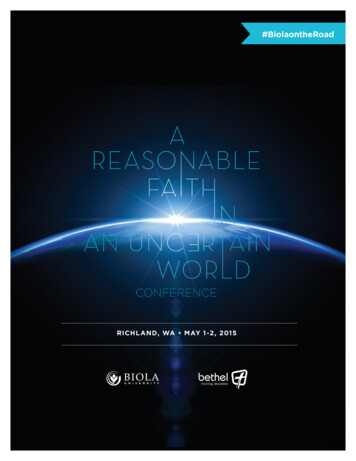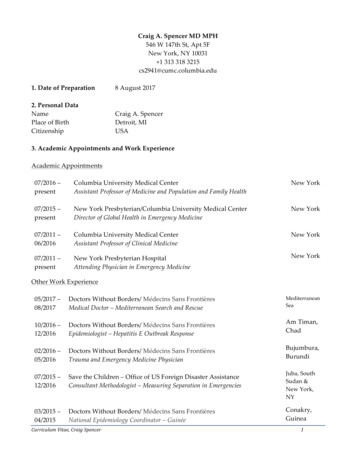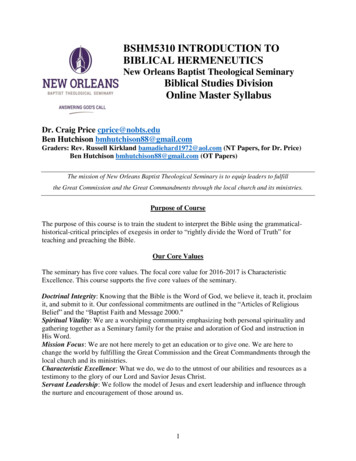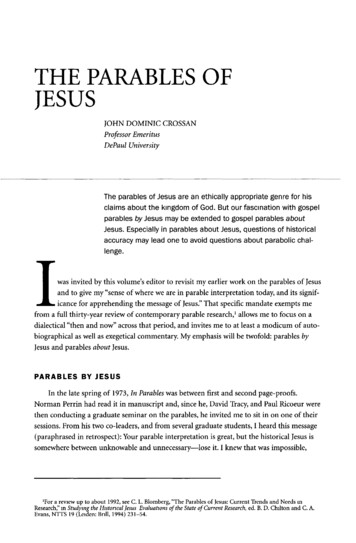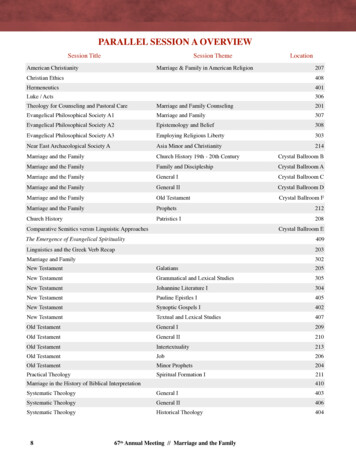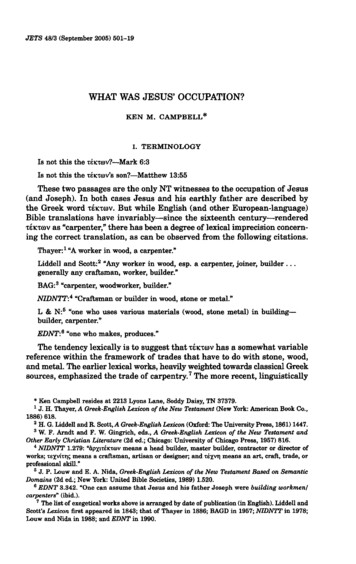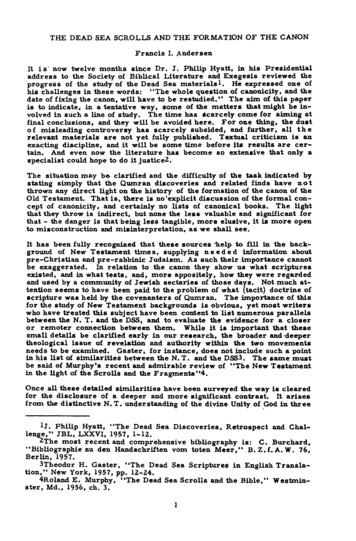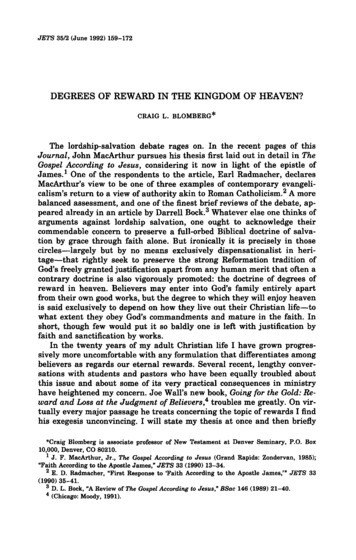
Transcription
JETS 35/2 (June 1992) 159-172DEGREES OF REWARD IN THE KINGDOM OF HEAVEN?CRAIG L. BLOMBERG*The lordship-salvation debate rages on. In the recent pages of thisJournal, John MacArthur pursues his thesis first laid out in detail in TheGospel According to Jesus, considering it now in light of the epistle ofJames. 1 One of the respondents to the article, Earl Radmacher, declaresMacArthur's view to be one of three examples of contemporary evangelicalism's return to a view of authority akin to Roman Catholicism.2 A morebalanced assessment, and one of the finest brief reviews of the debate, appeared already in an article by Darrell Bock.3 Whatever else one thinks ofarguments against lordship salvation, one ought to acknowledge theircommendable concern to preserve a full-orbed Biblical doctrine of salvation by grace through faith alone. But ironically it is precisely in thosecircles—largely but by no means exclusively dispensationalist in heritage—that rightly seek to preserve the strong Reformation tradition ofGod's freely granted justification apart from any human merit that often acontrary doctrine is also vigorously promoted: the doctrine of degrees ofreward in heaven. Believers may enter into God's family entirely apartfrom their own good works, but the degree to which they will enjoy heavenis said exclusively to depend on how they live out their Christian life—towhat extent they obey God's commandments and mature in the faith. Inshort, though few would put it so baldly one is left with justification byfaith and sanctification by works.In the twenty years of my adult Christian life I have grown progressively more uncomfortable with any formulation that differentiates amongbelievers as regards our eternal rewards. Several recent, lengthy conversations with students and pastors who have been equally troubled aboutthis issue and about some of its very practical consequences in ministryhave heightened my concern. Joe Wall's new book, Going for the Gold: Reward and Loss at the Judgment of Believers,4 troubles me greatly. On virtually every major passage he treats concerning the topic of rewards I findhis exegesis unconvincing. I will state my thesis at once and then briefly*Craig Blomberg is associate professor of New Testament at Denver Seminary, P.O. Box10,000, Denver, CO 80210.1J. F. MacArthur, Jr., The Gospel According to Jesus (Grand Rapids: Zondervan, 1985);"Faith According to the Apostle James," JETS 33 (1990) 13-34.2E. D. Radmacher, "First Response to 'Faith According to the Apostle James,"' JETS 33(1990) 35-41.3D. L. Bock, "A Review of The Gospel According to Jesus," BSac 146 (1989) 21-40.4(Chicago: Moody, 1991).
160JOURNAL OF THE EVANGELICAL THEOLOGICAL SOCIETYdefend it. I do not believe there is a single NT text that, when correctly interpreted, supports the notion that believers will be distinguished onefrom another for all eternity on the basis of their works as Christians.What is more, I am convinced that when this unfounded doctrine of degrees of reward in heaven is acted upon consistently—though, fortunately,it often is not—it can have highly damaging consequences for the motivation and psychology of living the Christian life.I begin with the parable of the laborers in the vineyard (Matt 20:1-16).The story is well known: Employees hired at many different timesthroughout the day all receive equal pay despite unequal work. I have recently defended in book-length form the hypothesis that many of Jesus'parables make three main points, one per main character. In my study ofthis passage I conclude:The three main points which the three groups of characters [in this parable]suggest. all deal with the status of individuals before God at the finaljudgment. (1) From the earlier groups of workers, one learns that none ofGod's people will be treated unfairly (cf. v. 4—"whatever is right I will giveyou"); that is, no one will be shortchanged. (2) From the last group of workerscomes the principle that many seemingly less deserving people will be treatedgenerously, due to the sovereign free choice of God. (3) From the unifying roleof the master stems the precious truth that all true disciples are equal inGod's eyes.5"All true disciples are equal in God's eyes." One does not have to acceptmy theory for interpreting the parables to find similar statements amongcommentators on this passage from a wide variety of theological persuasions. Expositors debate whether the different laborers represent peoplecoming to Christ at different times of life, in different eras of world history, or at different stages in Jesus' ministry. They do not agree as towhether those first paid represent Pharisees, who are excluded from thekingdom, or disciples, who are included. But almost everyone agrees thatJesus is teaching about a fundamental equality here among those who aretruly his disciples. All are rewarded alike. Consider the following catenaof quotations from disparate sources:In the parable of Jesus, the labourers who were engaged last show nothing towarrant a claim to a full day's wages;. in this apparently trivial detail liesthe difference between two worlds: the world of merit, and the world of grace;the law contrasted with the gospel.6To insist, as the parable does, that invitation, not justice, is the way of thekingdom radically subverts the kingdom of God as a reward for a faithfuland just life.7The parent-God evidently wishes to relate to all the children with a radicalequality. Once individuals and groups of people realize that they haveC. L. Blomberg, Interpreting the Parables (Downers Grove: InterVarsity, 1990) 224.J. Jeremías, The Parables of Jesus (Philadelphia: Westminster, 1972) 139.Β. B. Scott, Hear Then the Parable (Minneapolis: Fortress, 1989) 298.
DEGREES OF REWARD IN THE KINGDOM OF HEAVEN?161their place in this community and that they can neither lose nor earn moreof their acceptance, they begin to be freed from the need to compete with oneanother for what they most need in life.8Because God is so good, the principle of grace triumphs. The principle in theworld is that he who works the longest receives the most pay. That is just.But in the kingdom of God the principles of merit and ability may be setaside so that grace can prevail.9It is hard to see how one can take the imagery of the parable in anyother way. In fact so clearly does this story demonstrate grace and equality that most nonevangelical commentators dismiss v. 16 at once as a redactional conclusion that misses the whole point of the passage. Yet thereare at least three ways of understanding "the last will be first, and thefirst will be last."10 To be sure, this maxim could be an attempt to reinstate a system of ranking people within the kingdom, albeit on a radicallynew basis. But it may also be a vivid equivalent to the more prosaic truththat all numerical positions are interchangeable.11 What is more, Jesushas probably repeated this refrain to tie the parable back in with 19:1630, which concludes with nearly the identical words (v. 30) and in which"the last" are those excluded from the kingdom.12 A similar use of thisproverb appears even more plainly in Luke 13:30. In any event, no ranking need be seen among genuine believers.The imagery of the laborers in the vineyard also squares well with themore abstract concepts of "grace," "heaven" and "perfection." The vast majority of Scriptural texts that encourage people to prepare for judgmentday refer simply to two options: eternal life, or eternal death. Salvation isconsistently said to be by grace, damnation by works (cf. esp. Rom 3:215:21 with 1:18-3:20 respectively).13 There is an important asymmetryhere that preserves the sovereignty of God, giving him all the credit for redemption, alongside the accountability of men and women, giving them allthe blame for being "lost" (cf. esp. 9:22-24). 14 There does seem to be Scriptural support for the doctrine of degrees of punishment in hell, accordingto the extent of one's conscious transgression of God's laws (see esp. Luke12:47-48; cf. Matt 10:15; 11:22, 24; cf. also possibly Rom 5:13),15 but8F. H. Borsch, Many Things in Parables: Extravagant Stories of New Community (Philadelphia: Fortress, 1988) 37-38.9S. J. Kistemaker, The Parables of Jesus (Grand Rapids: Baker, 1980) 77-78.10All Biblical quotations in English follow the NIV.11See esp. J. B. Bauer, "Gnadenlohn oder Tageslohn (Mt 20, 8-16)," Bib 42 (1961) 224-228.12The refrain is phrased as it is also because of the reversal of sequence in payment in theparable itself. Cf. R. H. Stein, An Introduction to the Parables of Jesus (Philadelphia: Westminster, 1981) 126: "The beautiful staging must be observed. Although the order of hiring is, ofcourse, from the earliest to the latest, the payment of the wages is in reverse order. As a resultwe have a heightening of expectation on the part of the earliest workers."13On which see esp. N. M. Watson, "Justified by Faith; Judged by Works—An Antinomy?",NTS 29 (1983) 209-221.Cf. esp. C. E. B. Cranfield, A Critical and Exegetical Commentary on the Epistle to theRomans (Edinburgh: T. and T. Clark, 1979) 2.492-498.15Cf. esp. I. H. Marshall, The Gospel of Luke (Grand Rapids: Eerdmans, 1978) 544.
162JOURNAL OF THE EVANGELICAL THEOLOGICAL SOCIETYprecisely by this very lack of symmetry between works and grace wewould not expect endless gradations of reward within heaven. And whenone reflects soberly on the vast gulf that separates even the most righteous of believers from God's infinitely perfect standards it is hard to seehow the differences among Christians that seem to loom so large in thislife could figure significantly in God's eternal reckoning. The differences inelevation between Mount Everest and the Mariana Trench seem negligiblewhen the earth is viewed from Mars.The Biblical data concerning heaven, sparse though they are, seem inconcord with these suppositions. The most extensive teaching passage onthe topic is Revelation 21-22, and the clearest nonmetaphorical statementin these chapters is 21:4b: "There will be no more death or mourning orcrying or pain"—absolutely nothing to make one sad. But surely peoplewould live with some unending sense of regret and sadness if they realizedthat they had not attained to as high a level of enjoyment or privilege inheaven as they might have, had their lives on this earth proved more meritorious. Theologians often sense this problem and dismiss it by assumingthat we will not be conscious of such distinctions or that the great happiness of heaven will outweigh whatever small sense of regret remains. 16But these concessions, unsupportable by any Biblical texts, give away precisely what the doctrine of degrees of reward is supposed to ensure: a powerful motivation for living a life that pleases God now. If such gradationsare not preceptible or do not matter, why introduce them in the firstplace?Other inconsistencies abound as theologians try to make sense of a doctrine of varying rewards for Christians. Just what will they involve? Suggestions include capacity for service, added responsibilities, degrees ofbliss, an enriched relationship with God.17 The most honest writers admitthey are speculating at this point, as with Millard Erickson, who nevertheless goes on to ask: "May it not be that the difference in the rewardslies not in the external or objective circumstances, but in the subjectiveawareness or appreciation of those circumstances?"18 In other words,heaven is really the same for everyone, but not everyone experiences itequally well. This explanation stands on its head the more popular viewnoted above that, subjectively, we all equally appreciate differing objectiverealities. One cannot have it both ways—though Erickson, no doubt unwittingly, tries, when he goes on to add that no one will be aware of thesesubjective differences anyway.19A final logical question could be asked: If the heavenly aspect of eternallife represents perfection, is it not fundamentally self-contradictory to16Cf. respectively M. Erickson, Christian Theology (Grand Rapids: Baker, 1985) 3.12331234; L. Berkhof, Systematic Theology (Grand Rapids: Eerdmans, 1939) 737.17Cf. respectively J. MacArthur, Heaven (Chicago: Moody, 1988) 114; B. Milne, Know theTruth (Downers Grove: InterVarsity, 1982) 273; Berkhof, Theology 737; J. I. Packer, KnowingGod (Downers Grove: InterVarsity, 1977) 132-133.18Erickson, Theology 3.1234.19Ibid.
DEGREES OF REWARD IN THE KINGDOM OF HEAVEN?163speak of degrees of perfection? Surely theologians ought to reconsider adoctrine that involves an elementary lexical and conceptual fallacy.But what of the Scriptural data? 1 Corinthians 3:11-15 clearly distinguishes between the qualities of believers' works and their rewards onjudgment day. Five key passages speak of believers' crowns (1 Cor 9:25;1 Thess 2:19; 2 Tim 4:8; Jas 1:12; 1 Pet 5:4) and are often interpreted tomean that some Christians will receive more of them than others. Revelation 4:10 seems to pick up on this imagery, depicting the twenty-four elders casting their crowns before God's throne. Various texts identifypeople who are "least" or "greatest" in the kingdom (e.g. Matt 5:19; 11:11;18:4; Mark 9:34-35; Luke 9:48). And numerous other passages are oftencited. Does not Scripture itself force one to believe in eternal differentiations among Christ's followers?The crowns are most easily dispensed with. A majority of commentators agrees in each of the five instances that our texts are not at all talking about degrees of reward in heaven but simply about eternal life. In1 Cor 9:25, Paul compares our perseverance to the athlete striving afteran Olympic crown. But unlike a race on a track in which there can be onlyone winner, "we" [Christians] all should compete for "the crown that willlast forever." This "crown" is the same as the "prize" of vv. 24, 27, whichone fails to receive if one is "disqualified" (adokimos). Paul is not concerned to compare first place with second or third but to contrast finishingthe race with not finishing at all. In the words of Gordon Fee, the crown"is not some specific aspect of the goal but the eschatological victory itself."20 Being declared "approved" (dokimos) or "not approved" (adokimos)is also the imagery of pottery fired in kilns to see if it will survive or not.Eternal life and death are at stake here, not gradations of reward.A too simplistic understanding of "eternal security" has probably ledmany Christians to doubt that Paul could have seriously considered not"making it to heaven." But true Reformed doctrine recognizes that saintsare those who persevere. No Biblical text offers assurance of salvation forpeople who flagrantly repudiate Christ without subsequent repentance.Anthony Hoekema captures the sense of 1 Cor 9:26-27 quite well: "Onlyas he thus continued to discipline himself did Paul feel justified in claiming his spiritual security in Christ. He did not dare to claim this blessingwhile being careless and indolent in his daily battle against sin. And neither may we."21"The crown of boasting" of 1 Thess 2:19 proves no different. It appearsin synonymous parallelism with the "hope" and "joy" of eternal life itself,the pleasure of unending fellowship with other believers whom we haveplayed some role in helping to nurture. As Howard Marshall explains, theexpression is a Hebraism (cf. Prov 16:31), equivalent to"a crown to boast of" or rather "a crown to exult in"; from what Paul sayselsewhere about the impossibility of men boasting of their own achievements2021G. D. Fee, The First Epistle to the Corinthians (Grand Rapids: Eerdmans, 1987) 437.A. A. Hoekema, Saved by Grace (Grand Rapids: Eerdmans, 1989) 251.
164JOURNAL OF THE EVANGELICAL THEOLOGICAL SOCIETYbefore God (Rom. 3:27; 1 C. 1:29) it may be taken for granted that Paul is notlooking forward here to any sort of proud display of his apostolic achievements before the Lord Jesus, but is rather thinking of the joyful exultationwhich he will be able to feel when the work which God has done through him(1 C. 15:10) is recognized.22All true believers will experience some such exultation, no doubt in varying ways, but the passage says nothing of different crowns for differentquantities of joy.In 2 Tim 4:8 commentators debate whether dikaiosynës in the expression "crown of righteousness" is an appositional genitive or ablative ofsource. But either way it can hardly be a reward that distinguishes onebeliever from another, in view of the conclusion of the verse: "which theLord, the righteous Judge, will award to me on that day—and not only tome, but also to all who have longed for his appearing."23 Surely one whohas never wished for Christ's return cannot have truly been his disciple.In Jas 1:12 the "crown of life" almost certainly employs an appositionalgenitive, inasmuch as it applies to those who have persevered under trial,who are in turn taken to equal all who love God.24 Again, although not allbelievers always respond properly to God or to trials, all do so sometimes.In the larger context of James it seems clear that such predicates refer toall Christians, not just to some specific category of them (cf. 1:2-4; 2:5;3:17-18; 5:7-11).1 Peter 5:4 leaves fewer contextual clues to help us interpret the"crown of glory that will never fade away," which faithful elders receive.But in view of the recurring pattern in the previous four passages it isprobably most natural to take this crown too as a metaphor for eternallife. Every other reference to believers' "glory" in 1 Peter confirms this presumption (1:7; 4:13-14; 5:10), so that the elders' crown is nothing otherthan that which "all who share in the Christian hope" can expect.25The twenty-four elders who cast their crowns before God's throneprobably remain irrelevant to the topic at hand. The most likely interpretation of Revelation's symbolism at this point takes the elders to be angelic creatures rather than raptured believers. The way these eldersdistance themselves from Christ's work on behalf of humanity, in the songthey sing in Rev 5:9-10, seems to confirm this understanding.26 Angelicbehavior can scarcely prove anything about the likelihood of human rewards. Even if the elders were human, their number would suggest a combination of the twelve patriarchs of Israel with the twelve apostles,27 inwhich case one may still not deduce any general doctrine that would applyto all believers. And even if these elders did turn out to stand for the222324252627I. H. Marshall, 1 and 2 Thessalonians (Grand Rapids: Eerdmans, 1983) 87.Cf. J. N. D. Kelly, A Commentary on the Pastoral Epistles (London: Black, 1963) 210.Cf. P. H. Davids, The Epistle of James (Grand Rapids: Eerdmans, 1982) 80.J. R. Michaels, 1 Peter (WBC; Waco: Word, 1988) 287.R. H. Mounce, The Book of Revelation (NICNT; Grand Rapids: Eerdmans, 1977) 135.P. E. Hughes, The Book of Revelation (Grand Rapids: Eerdmans, 1990) 72.
DEGREES OF REWARD IN THE KINGDOM OF HEAVEN?165whole Church28 their very surrender of their crowns would prove mypoint: Whatever differences believers may experience on judgment day arenot perpetuated throughout eternity.1 Corinthians 3:11-15 reinforces this observation. Here if ever appearsa clear distinction between believers whose works endure their fiery purgation and those whose flimsy construction projects are consumed. Paulmakes plain that both categories of Christians "will be saved" (v. 15), butone only as "escaping through flames" since such a person "will sufferloss." Still, two caveats must be registered. First, while there is absolutelyno disputing the uniqueness of every believer's personal encounter withChrist on judgment day, nothing in the text says anything about these distinctions among believers' experiences persisting for all time. In like fashion, 1 John 2:28 anticipates that some Christians may experience moreshame than others when Christ returns,29 but no Scripture ever suggeststhat shame remains a component of heavenly life beyond the immediatecontext of the parousia.Second, it is not nearly so clear as many assume just what the impliedobject of zëmiothësetai ("he will suffer loss") is in 1 Cor 3:15. Most take itto be "his reward" of v. 14, but the nearer noun, syntactically, is to ergon("the work") of v. 15a (NIV "what he has built"). This fits perfectly in context. As David Prior explains, what the believer loses, then, is the satisfaction of seeing much of his life's work count in an eternal perspectivebefitting kingdom priorities. "No doubt every Christian's work is mixed inquality; no doubt we shall all have the awesome sadness of seeing much ofour work burned up."so The reward that more faithful believers enjoy, then,becomes nothing more or less than knowing that they did spend substantialtime on building things that would last into eternity: winning people to theLord, discipling them, being good stewards of all the resources with whichGod entrusted them, and the like. 31 Most commentators recognize that2 Cor 5:10, with its mention of believers appearing before the judgment seatof Christ, refers back to 1 Corinthians 3, so what one does with the formertext must carry over to the latter. And both of these texts speak only ofjudgment day, not of an everlasting hierarchy in heaven.There remain those passages that speak of individuals who are "least"or "greatest" in God's kingdom. The crucial question here, however, is this:Which of the two temporal aspects of the kingdom is in view—present, orfuture? In Matt 11:11 (par. Luke 7:28) only the present aspect of the28As e.g. in J. F. Walvoord, The Revelation of Jesus Christ (Chicago: Moody, 1966) 107;C. C. Ryrie, Basic Theology (Wheaton: Victor, 1986) 512.29See esp. S. L. Hoyt, "The Negative Aspects of the Christian's Judgment," BSac 137 (1980)128-130.30D. Prior, The Message ofl Corinthians (Downers Grove: InterVarsity, 1985) 60 (italics his).1Cf. also Fee (First Corinthians 143-144), who emphasizes the corporate nature of the reward or its loss, in view of the plural pronouns and the context of vv. 16-17. The destructionthen becomes "the church's failure to function any longer as a viable alternative to Corinth bymanifesting the nature and fruit of the gospel within totally pagan surroundings."
166JOURNAL OF THE EVANGELICAL THEOLOGICAL SOCIETYkingdom makes any sense. If "among those born of women there has notrisen anyone greater than John the Baptist," and "yet he who is least inthe kingdom of heaven is greater than he," it cannot be because everyChristian who has ever lived, however carnal, has proved more virtuousthan John the Baptist. Rather, Jesus must mean that John, despite beingthe greatest of prophets of the OT age, lost out on an incredible privilegeby not living long enough to see the new covenant inaugurated with thecomplex of events including Christ's death, resurrection, exaltation andsending of the Spirit at Pentecost.32Matthew 11:11 should thus be allowed to influence our understandingof similar sayings of our Lord. In 5:19, those who practice and teach God'scommands are "great" in the kingdom while those who break them andteach others to do likewise are "least." As an isolated saying this could betaken to refer to rewards in the eschaton, but it is at least equally appropriately interpreted as referring to those whom God deems more or lesspleasing to himself now in this life even as they perform their teachingministries.33 A careful reading of 18:4 in context confirms this suggestion.There Jesus declares that "whoever humbles himself like this child is thegreatest in the kingdom of heaven." But in the previous verse he hasstated equally forcefully that "unless you change and become like littlechildren, you will never enter the kingdom of heaven." So the criterion forgreatness is precisely the criterion for entrance.34 Meizön is clearly a superlative used as an elative, as was common in Hellenistic Greek. Thepresent tense "is" probably also is significant. As in the partial parallel inLuke 9:48 ("Whoever welcomes this little child in my name welcomes me;and whoever welcomes me welcomes the one who sent me. For he who isleast among you all—he is greatest"), it is status within the present aspect of the kingdom that Jesus has in mind (so also in Mark 9:34-35). 35Whereas the world glorifies those who exhibit the character traits of machismo, God deems most worthy, now in this same world, those who remain humble and unassuming (cf. Matt 5:3, 10; cf. vv. 4-9).Numerous other texts might be cited in defense of rewards, but nonebears the weight of the doctrine. Matthew 19:28 promises the twelve thatthey will judge the tribes of Israel, but 1 Cor 6:2-3 reminds even the carnal Corinthians that they will judge the whole world and even angels. It ishard to see the apostles' "privilege" as any greater honor, if indeed it iseven limited to the twelve. 36 The final Matthean beatitude promises agreat reward in heaven to those who endure persecution (Matt 5:12), but32For more detailed exegesis of this text and the other passages from Matthew to be discussed see C. L. Blomberg, Matthew (Nashville: Broadman, forthcoming).33Cf. Η. Ν. Ridderbos, Matthew (Grand Rapids: Zondervan, 1987) 101.3Cf. ibid. 332: Jesus "rejected their envious competition."35Cf. Marshall, Luke 398: "The clause is concerned not with becoming great by acting as aservant but with being great" (italics his).36Most commentators on Matthew see the twelve as "transparent" for all disciples of Jesus.On this passage cf. e.g. R. T. France, The Gospel according to Matthew (Grand Rapids: Eerdmans, 1985)288.
DEGREES OF REWARD IN THE KINGDOM OF HEAVEN?167this text simply repeats the theme of v. 10 in which the blessing for endurance is "the kingdom of heaven." The "great reward" of v. 12 must therefore refer to the kingdom itself rather than some special status within it.What is more, in the context of the beatitudes God's reward is more apromise of "future recompense for a present condition of persecution andreproach" than a response to piety.37The same must be said of the other Matthean "reward" passages. Thereward that those who do their "'acts of righteousness' before men, to beseen by them" (6:1) fail to acquire, in view of the parallel with hypocritesand pagans (in vv. 5, 7), must be heaven itself. The reward that those whoappropriately minister to prophets, righteous people, and "little ones"(10:41-42) receive is reception by God (v. 40; cf. also Mark 9:41). "Treasures in heaven" (Matt 6:20; par. Luke 12:33; Matt 19:21) appears in synonymous parallelism with "getting eternal life" (Matt 19:16) and "enteringthe kingdom of heaven" (19:23). In 1 Tim 6:19, those who "lay up treasurefor themselves as a firm foundation for the coming age" are coterminouswith those who "take hold of the life that is truly life."Several NT texts warn believers that they must give an accounting tothe Lord for every deed performed (Rom 2:6; Rev 22:12) and word uttered(Matt 12:36; Luke 12:2-3), but nothing in the contexts of any of those passages suggests varying degrees of reward or the perpetuating of distinctions beyond the Day of the Lord. The purpose of Christians' standingbefore God's bar of justice is to declare them acquitted, not to embarrassthem before the entire cosmos for all their failings (Rom 2:7; Rev 22:14;Matt 12:37a).38 The contrast in each of these three passages is between thesaved and the lost, not between two or more different kinds of believers.In Matt 10:35-45 and parallels, James and John ask Jesus if they maysit at his right and left hands when he comes into his glory. Undoubtedly,in view of the standard Jewish doctrine of rewards they were hoping forthe highest status possible in the coming age, though in view of conventional Jewish messianic expectation they may well have conceived of anearthly kingdom and temporal glory. Jesus' reply in 10:40 leaves the dooropen for some people to receive such a higher status, but tellingly Christrefuses to discuss that option, redirecting his disciples' attention to servanthood instead and employing the language of present rather than future greatness (vv. 43-44) already observed in Luke 9:48. If I am wrongand the typical evangelical doctrine of reward is correct, that doctrine stillmay not be used as a motivation for "empire-building."39 But fresh on theheels of the parable of the laborers in the vineyard (cf. the sequence ofpassages in Matt 20:1-16, 20-28) it is hard to imagine that Jesus is here37W, C. Allen, A Critical and Exegetical Commentary on the Gospel according to St. Matthew (Edinburgh: T. and T. Clark, 1907) 42.38Cf. J. T. Mueller, Christian Dogmatics (St. Louis: Concordia, 1955) 630.39Cf. D. A. Carson, "Matthew," in The Expositor's Bible Commentary (ed. F. E. Gaebelein;Grand Rapids: Zondervan, 1984) 8.432: "One of the ironies of language is that a word like 'minister,' which in its roots refers to a helper, one who 'ministers,' has become a badge of honorand power in religion and politics."
168JOURNAL OF THE EVANGELICAL THEOLOGICAL SOCIETYreinstating heavenly hierarchies at all. The shorter parallel in Luke22:26-27 seems more clearly to limit differentiation of status to thepresent age: "The greatest among you should be like the youngest, and theone who rules like the one who serves." This synonymous parallelism identifies "the greatest" as those who are currently ruling over God's peoplewith appropriate servant-leadership.The parables of the talents (Matt 25:14-30) and the pounds (Luke19:11-27) are often cited as teaching the doctrine of varying heavenly rewards. But this is to press the imagery of the parables beyond what evena controlled allegorization warrants. In each passage three servants appear. Two reflect faithful stewardship, one depicts gross negligence. Ineach case the solitary talent or pound is taken from the faithless servantand given to the first of the two faithful investors. But Jesus has drawnsuch careful parallelism between each o
heaven as they might have, had their lives on this earth proved more mer-itorious. Theologians often sense this problem and dismiss it by assuming that we will not be conscious of such distinctions or that the great happi-ness of heaven will outweigh whatever small sense of regret remains.16 But these concessions, unsupportable by any Biblical .
